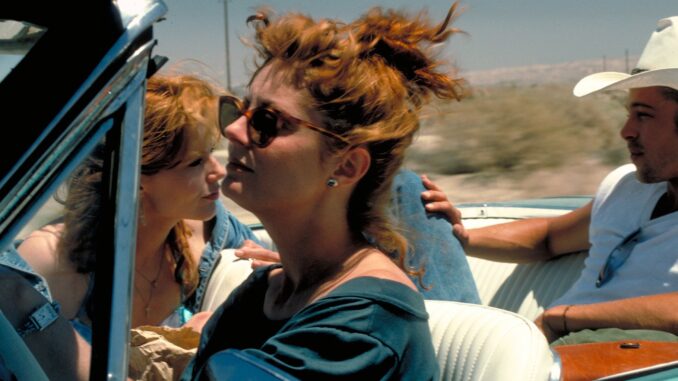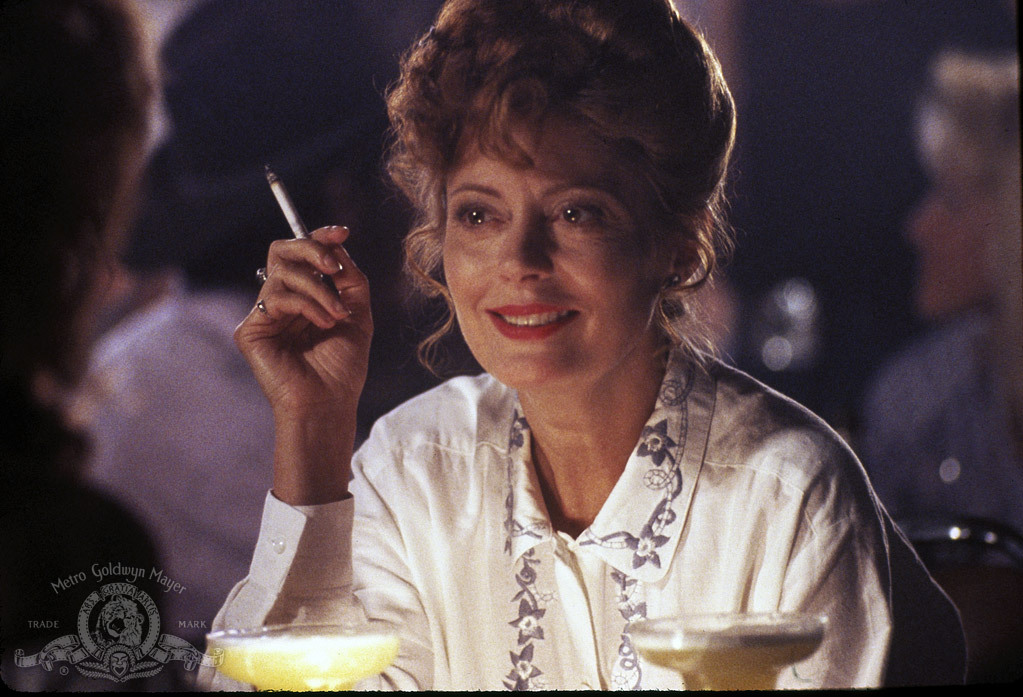
Thelma & Louise (1991) is more than just a film about two women on the run; it is a profound exploration of the human condition, particularly in the context of female empowerment and the complexities of morality. At the heart of this narrative is Louise Sawyer, a character whose journey is marked by an intense internal struggle between seeking justice and yielding to the darker pull of vengeance. Through Louise, the film delves into how personal trauma and societal injustices can collide, leading to decisions that defy simple categorization as right or wrong.
The Origins of Louise’s Inner Turmoil
Louise’s internal conflict is deeply rooted in a traumatic past that the film subtly hints at but never fully discloses. There are strong implications that Louise experienced a traumatic event, likely a sexual assault, in Texas—an event that has left an indelible mark on her psyche. This past trauma resurfaces with full force when Harlan attempts to rape Thelma. Louise’s instinctive and lethal response is not merely an act of protection; it is also an eruption of long-buried anger and pain. At this moment, the lines between justice and vengeance begin to blur for Louise, setting the stage for the moral conflict that will drive her actions throughout the film.

The Pursuit of Justice
In the immediate aftermath of Harlan’s death, Louise’s focus shifts to survival. She becomes determined to navigate a legal system she increasingly distrusts. Initially, her pursuit of justice is intertwined with the need for self-preservation—she is acutely aware that, as women, they are unlikely to receive fair treatment, particularly in a case involving the death of a man who attempted sexual violence. Louise’s actions are driven by a desperate need to protect both herself and Thelma from a system she perceives as inherently biased and unjust.
As their journey unfolds, Louise’s disillusionment with conventional justice deepens. She realizes that the legal system, designed to protect, is more likely to punish them for their defiance against male dominance. This growing disillusionment causes Louise to question the very concept of justice—what it means, who it serves, and whether it can ever be truly impartial in a world that so often fails women.
The Temptation of Vengeance
As the injustices they encounter mount, Louise’s motivations begin to shift. What starts as a fight for survival gradually morphs into something darker—a desire for retribution. This transformation is evident when Louise decisively refuses to return to Texas, the place of her trauma, which symbolizes not just a geographical location but a return to a system that failed to protect her in the past. Her decision to keep moving forward, away from Texas, marks a turning point where her actions are driven less by the hope of justice and more by the need to assert control over her life in a world that has repeatedly tried to take it away from her.
Louise’s actions become increasingly bold and reckless, fueled by a simmering anger that seeks release. Her journey starts to resemble not just a quest for justice but also a form of resistance—a rebellion against a society that has systematically oppressed her and Thelma. In this context, vengeance becomes a means of reclaiming the power that has been denied to her for so long. Her acts of defiance are not just about escaping the law but about making a statement, about asserting her agency in a world that seeks to deny it.

The Climactic Decision: Justice or Vengeance?
The film’s climax at the Grand Canyon encapsulates the culmination of Louise’s inner struggle. Faced with the inevitability of capture and the grim reality of what that would entail, Louise makes a decision that is both shocking and deeply symbolic. Her choice to drive off the cliff is an ultimate act of defiance—a refusal to be taken alive, to be judged by a system that she knows will never see her actions as anything but criminal. This moment of decision is where justice and vengeance merge into a singular, final act of liberation. It is as much about escaping the oppressive forces that have pursued them as it is about asserting her and Thelma’s right to define their own fate, on their own terms.
Louise’s journey in Thelma & Louise is a powerful narrative that explores the thin line between justice and vengeance. Her actions, shaped by a past filled with trauma and a present fraught with systemic injustice, reveal the complexities of navigating a world that often fails to protect those most in need. Louise is not just a victim, nor is she simply a vigilante; she is a woman grappling with the profound moral dilemmas posed by a society that has wronged her. Her ultimate act of defiance is not just a rejection of the world that has failed her but also a powerful assertion of her own autonomy. Through Louise, Thelma & Louise offers a timeless exploration of the human condition and the relentless pursuit of justice, even when it requires stepping outside the bounds of the law.

Leave a Reply